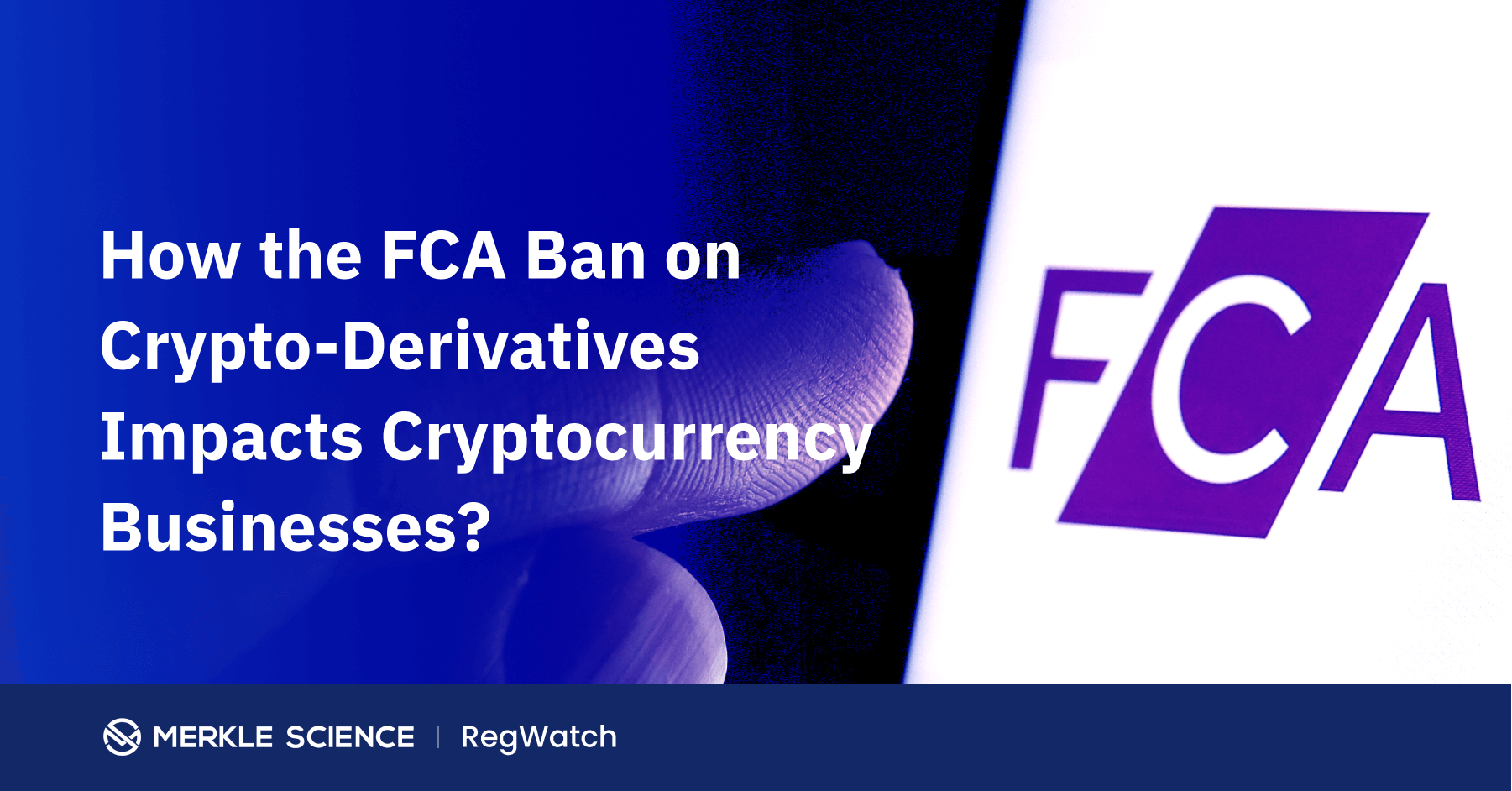How the FCA Ban on Crypto-Derivatives Impacts Cryptocurrency Businesses?

Merkle Science

A guest post by Claire Cummings from Cummings Pepperdine
SPEEDREAD
In October, the FCA announced a ban on the sale of crypto-derivatives and exchange-traded notes (ETNs) that reference certain types of crypto-assets (crypto-ETNs) to retail consumers.
This means that those firms that market, distribute, or sell crypto-derivatives or crypto-ETNs to retail consumers will need to either cease these activities or comply with the FCA’s rules by 6 January 2021.
This has the potential to lead to loss of profits, perhaps through closing down a business line or having to spend more time and money on becoming correctly regulated.
There are a few solutions to this supposedly gloomy outlook though. Firms can consider restructuring their business offering or seeking help from experts to get through the FCA process as smoothly as possible.
Whichever route you take, we can help you take steps that are intended to minimize costs and increase profit.
Just schedule a free initial call with MiCA advisor Claire Cummings by clicking here or talk to Merkle Science’s compliance expert, Tom Lou, here.
Summary
In October, the FCA announced a ban on the sale of crypto-derivatives and exchange-traded notes (ETNs) that reference certain types of crypto-assets (crypto-ETNs) to retail consumers.
This means that those firms that market, distribute, or sell crypto-derivatives or crypto-ETNs to retail consumers will need to either cease these activities or comply with the FCA’s rules by 6 January 2021.
Which activities are impacted by the ban?
The ban prohibits sales, distribution, and marketing of crypto-derivatives and crypto-ETNs to retail consumers. It is important to note that marketing includes, but is not limited to, communicating and/or approving financial promotions.
Which assets are caught by the ban?
The only assets which are in this ban are crypto-derivatives and crypto-ETNs which reference unregulated transferable crypto-assets are caught by the ban. The ban does not include crypto-derivatives and crypto-ETNs which reference any of the below:
- security tokens;
- e-money tokens;
- tokens that are not widely transferable (for example, tokens used on a private network that can only be redeemed with the issuer);
- commodities where ownership is recorded on the blockchain (crypto-commodities); and
- central bank digital currencies (CBDCs).
What if my retail customers already hold these banned assets?
Retail customers who already holding crypto-derivatives and crypto-ETNS can keep them until they decide to sell. There is no time limit on this.
The FCA does not require or expect firms to close out retail consumers’ positions unless their clients ask them to do so.
Which firms are caught by the ban?
The following firms will have to comply with the ban from 6 January 2021 if they have retail customers (and note that the FCA has said they will be watching for anyone who tries to opt up to their retail customers to elective professional clients or move retail consumers to associated non-UK entities to circumvent the ban):
- firms which are regulated by the FCA
- UK branches of overseas
- EEA firms who use the temporary permissions regime to continue to provide services in the UK post-Brexit.
- firms issuing or creating products referencing crypto-assets;
- firms distributing products referencing crypto-assets, including brokers, investment platforms, and financial advisers;
- firms marketing products referencing crypto-assets; and
- operators of trading venues and platforms.
What do these firms need to do?
The ban comes into force on 6 January 2021 which means that firms need to act now or risk being subject to supervisory and enforcement action by the FCA.
These firms need to consider whether to amend their business activities or apply to the FCA to add to their permissions.
Next steps
Whichever route you take, we can help you take steps that are intended to minimize costs and increase profit.
Just schedule a free initial call with FCA advisor Claire Cummings by clicking here or talk to Merkle Science’s compliance expert, Tom Lou, here.
About the author
Claire Cummings is a solicitor who has over 20 years’ experience in financial services for alternative investments, with particular expertise in crypto-assets and the digital asset arena and is currently the Managing Partner at Cummings Pepperdine.
As a solicitor, Claire has acted as alternative funds and fund managers, brokers, and distributors and has spent time as in-house counsel, director, and compliance officer of a CTA advising on a wide range of transactions. Claire’s work includes advising on FCA’s rules on marketing crypto-assets, MiCA, AIFMD, MiFID II, and EMIR issues, and also guiding organizations on cryptocurrencies, token issues/ICOs, setting up funds, and drafting fund documentation.
Claire draws on her experience as a solicitor, managing partner, and director of a fund management company to work with her clients as they establish and build their businesses.


